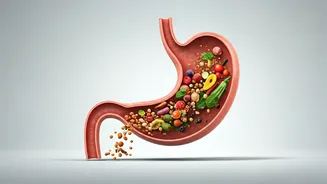What Are Deficiencies?
Nutrient deficiencies occur when the body lacks sufficient amounts of essential vitamins and minerals needed for optimal functioning. These vital nutrients
play crucial roles in countless bodily processes, ranging from energy production and immune function to cell growth and repair. The deficiency of even a single nutrient can trigger a cascade of health issues. Several factors contribute to these deficiencies. Inadequate dietary intake is the most common cause, with diets lacking in nutrient-rich foods like fruits, vegetables, whole grains, and lean proteins being a significant contributor. Certain health conditions can also impair nutrient absorption or increase nutrient demands. For instance, individuals with digestive disorders may struggle to absorb nutrients efficiently. Similarly, pregnant women and those with certain chronic illnesses often have higher nutrient needs. Lifestyle choices, such as excessive alcohol consumption, smoking, and chronic stress, can further deplete the body's nutrient stores, intensifying the risk of deficiencies and potentially affecting overall health.
Common Deficiencies
Several nutrient deficiencies are prevalent globally, with varied implications for health. Iron deficiency is particularly common, especially among women and children. This can lead to anemia, resulting in fatigue, weakness, and impaired cognitive function. Vitamin D deficiency is another widespread issue. It is often linked to insufficient sun exposure, dietary limitations, or poor absorption. It can compromise bone health, weaken the immune system, and elevate the risk of chronic diseases. Vitamin B12 deficiency is also notable, particularly affecting older adults and vegetarians. Symptoms can include fatigue, neurological problems, and anemia. Other key nutrient deficiencies of concern include folate, important for cell division and growth; calcium, vital for bone health; and magnesium, essential for muscle and nerve function. The symptoms and effects of each deficiency will vary depending on the specific nutrient and the severity of the deficiency. Recognizing the signs of these deficiencies is crucial for early intervention and effective management.
Identifying the Signs
Recognizing the signs and symptoms of nutrient deficiencies is essential for prompt intervention. However, it can be tricky, as symptoms often overlap and can be subtle initially. Fatigue, weakness, and brain fog are common indicators that may suggest deficiencies in iron, vitamin B12, or other essential nutrients. Skin changes such as dry skin, rashes, and hair loss can be indicative of deficiencies in vitamins A, C, D, or zinc. Oral manifestations like mouth sores, bleeding gums, or tongue inflammation may point to deficiencies in B vitamins or iron. Changes in vision, such as night blindness or blurred vision, might signal a deficiency in vitamin A. Additionally, mood swings, irritability, or depression could be related to deficiencies in B vitamins or omega-3 fatty acids. If you experience these symptoms, it's wise to consult a healthcare professional. They can conduct appropriate tests, such as blood tests, to identify specific deficiencies and recommend suitable management approaches.
Dietary Strategies
Dietary choices play a pivotal role in preventing and addressing nutrient deficiencies. Prioritizing a well-balanced diet rich in diverse, nutrient-dense foods is crucial. This involves consuming a variety of fruits and vegetables, which provide essential vitamins, minerals, and antioxidants. Incorporating lean proteins, such as fish, poultry, beans, and lentils, is essential for amino acids and iron intake. Whole grains like brown rice, quinoa, and oats, provide fiber and B vitamins. Healthy fats, including those from avocados, nuts, seeds, and olive oil, are also important for nutrient absorption and overall health. Furthermore, being mindful of portion sizes and choosing whole, unprocessed foods can greatly improve nutrient intake. It is also important to consider nutrient-rich food preparation techniques, such as steaming or baking vegetables to retain their nutrients. By making informed food choices and embracing a balanced eating approach, individuals can significantly reduce the risk of deficiencies and support their overall well-being.
Supplementation and Support
While a balanced diet is the cornerstone of nutrient intake, supplementation may be necessary to address specific deficiencies. However, it's essential to consult with a healthcare professional before starting any supplements. They can assess your individual needs and help you choose the right supplements and dosages. Iron supplements are often prescribed for iron deficiency, while vitamin D supplements are commonly recommended to counter low levels of vitamin D. Vitamin B12 supplements may be needed for those at risk of B12 deficiency, and calcium supplements can be beneficial for those with inadequate calcium intake or bone health concerns. Beyond supplementation, lifestyle modifications such as getting regular exercise, managing stress, and getting adequate sleep can optimize nutrient absorption and utilization. Additionally, addressing underlying health conditions that may interfere with nutrient absorption or increase nutrient needs is essential. By combining appropriate supplementation with supportive lifestyle choices, individuals can effectively manage and prevent nutrient deficiencies.



















